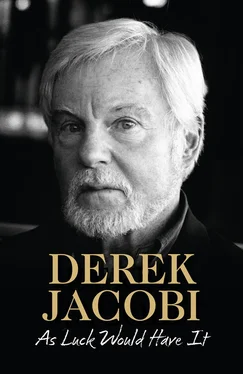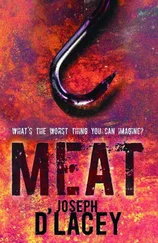Later I would say that the actor must somehow have got in there right from the start, at the moment of conception, but God knows where he came from. Was I simply born an actor, as grandly titled by Edmund Kean – ‘A prince and an actor’ – a part which I was to play later in Jean-Paul Sartre’s play? Even then, in that earlier time as a child, the first part I ever acted was a prince, and this prince was by no means to be the last.
We take it for granted that actors can act; the skill or craft – or the trick – is to make people believe they are seeing somebody real on stage, not an actor acting. Ideally they should leave the theatre talking about the person they’ve seen and the emotions they’ve felt, not saying, ‘Gosh, isn’t he a good actor?’ That suggests that it has been merely a spectator sport, and the actor has been showing off. Audiences or viewers want to believe they have been in the presence of a real person.
But theatre, film and television are trickery; a bit of a performance works, and I glow to myself. I know I’ve managed to carry it off, and it is a moment of pure, private pleasure. As every actor does, I have felt the power and the glory of trickery and mystification.
Yet who would ever have suspected that that little boy who was so excited at putting on his mum’s wedding veil would in time come to play real and fictional people – Hamlet, Lear, Hitler or Alan Turing, and a great host of others? Who could ever have known that he would come to live in the palaces or grand locations of his games and imagination, or re-inhabit in stories the real places, such as Bletchley, or the suburbia-like lower-middle-class Leytonstone, which had an importance in his early life?
It was the fate and destiny established way back in my past, in my childhood or before, that there would be many, many parts, well over the 200 mark through my seven ages, behind which I would hide my true self, conceal myself as behind a veil, yet at the same time be able to reveal some of who and what I was.
AGE I
INFANT, MEWLING
It was all a ghastly mistake. The state of the world at that time was such that no one thought of having a family. Hitler was already advancing fast and the world was on the brink of war when I was born in East London on 22 October 1938.
This was in our front room in Leytonstone. My mum – Daisy – struggled in labour for forty long hours to give birth. Forty hours! Has anyone ever taken so long to be born? It must be a record. Mum was completely worn out, and when at last I’d been delivered she sank back and groaned, ‘Never again!’
‘Is this what it’s all been about?’ said our doctor, as he held me up with just his right hand to show Mum and Dad. Mum and I were then placed in an improvised oxygen tent to recover. She had no more children.
The labour may have been endlessly protracted and I was probably the most appallingly mewling, puking infant, but from that moment on I was the sole object of my parents’ love and attention. They lived for me, exclusively and without reservation. Each Christmas Day, for instance, I would wake, rub my eyes and gaze in utter wonder at my presents at the end of the bed: not one but two pillowcases stuffed full of presents of every kind – games, toy trains, Meccano, jigsaws – all just for me!
There would never be anyone else in the house besides the three of us: my parents and me. It encouraged me to have the highest ideals and aspirations, and it may well be that the romanticism stemmed from this extraordinary good fortune of being favoured as an only child, with devoted and loving parents, while they, too, grew steadfastly more romantic about me. They always believed in the best of me – and wanted the best for me – in spite of anything that might not prove them right.
So from the start I had no rival; at times I might have missed the presence of a brother or sister, but actually, I had to remember, not only did I get all the pocket money and all the presents, but I carried all their fears, love and aspirations. As my mum Daisy and my dad Alfred both worked, I thought at first we were favoured with wealth and good fortune, but when I found out we weren’t, it didn’t really matter.
There were few disadvantages in being so well favoured from the start. I might certainly claim that I’ve been ‘dogged’ by good luck, so maybe that’s my misfortune, and the huge obstacles to overcome that most people have to face to make their way in the world – I’ve had very few of these. Heartbreaks yes, but that seriously – as we shall see – is another matter. For I was born a romantic, however much I might want to wrestle with it and deny it. Seventy-five years later I am still as much a romantic as I ever was, and still as unromantic in appearance as ever I was.
Yet I have an abiding sense of never having been taken quite seriously enough – that is, it goes without saying, as I take myself! I’ve always felt there was something about me which doesn’t give off that radiation, that sense of power – either it is my look, or the life journey I’ve been through – which doesn’t have suffering crying out at every twist and turn. It is true that few have taken me as seriously as I’d like to have been taken.
Nor have I championed anything, nor been a martyr to anything – no, and I’ve never been much of a mover or a shaker either, always a follower. If I haven’t suffered enough – mea culpa , I pray I might be forgiven, for isn’t it the dogma of today that to be taken really seriously you have to have suffered? But I haven’t and I can’t help it!

Our terraced house in Essex Road was built in red and brown brick, with an iron gate and tiny paved area in front, bay windows, yellow and red brick features and some fancy stuccoed panels: an average, lower-middle-class property. There were three bedrooms upstairs, Mum and Dad’s, mine, and a spare room. At the back was a modest garden where, as I grew into childhood, I used to run around with friends and knock tennis balls about.
Mum and Dad bought the house before my birth, when George VI was on the throne. They paid £800 for the freehold and it took them twenty-five years to pay off the mortgage. They told me later that when they moved in there were green fields and cows opposite, but these were soon replaced by the inevitable blocks of flats. I don’t remember any green fields or herds of cows, so for me these flats were always there.
The front room was where we went into on Sundays, the special day, the day of rest, although Mum and Dad rarely if ever went to church. It was the room where the best furniture was kept, well dusted and tidy. Where we played and listened to the gramophone records. Where the cocktail cabinet, the central feature of the front room, was stationed, and where Mum and Dad would display the drinks – which would never be drunk most of the year. The expectations of booze, of parents with their gin and tonics or their nightly glasses of wine, not to mention six pints downed at the pub, were never there for any of us – so different from the way it is for many children born today.
The exception was of course at Christmas, when the cherry brandy would be poured, and then imbibed to celebrate the tree lights being switched on. The radiogram cabinet was huge, almost as big as a sideboard. It housed the sole piece of broadcasting equipment – the sacred wireless, with white buttons and dials to twirl and press, and rasps and crackles of static and a muddle and jumble of strange tongues, like Pentecost, to which we all listened dutifully, even religiously. There were just three channels – the Home Service, the Third Programme and the Light Programme – and that was all there was, well before television came along. The notion of constant choice and switching channels just didn’t enter into it.
Читать дальше













